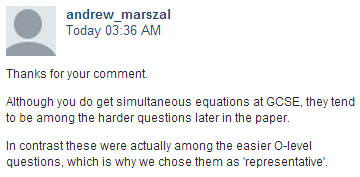Here's the headline from the Telegraph article (linked to from the front page of their website on GCSE results day (22 Aug 2013).
This doesn't bode well already. Surely they can't pick a handful of GCSE paper questions and a handful of O-level questions and then claim that this can help us tell which exam is more difficult? Can they?
Here's the test rubric:
Ah, apparently they can.
In the article that follows the quiz it says this:
Perhaps unsurprisingly, at least some of the people who did the quiz immediately zoomed down to add their comments and did not read the article. I know this because of the number of comments that mention how ridiculous it is to have a multiple-choice GCSE exam. Here is an example:
Just in case anyone is uncertain on this point, neither the current GCSE exam, nor the O-level questions that were used were originally multiple-choice!
But what does it say at the end of the article? "GCSE questions are from AQA 'GCSE November 2012 Sample Questions'." These questions don't appear to be freely available online. When the new exam specifications were put forward for approval by Ofqual, the awarding bodies were also asked to submit 'sample assessment materials' so people could see what they intended the exams to look like. These sample materials were not 'live' exam questions and were never used as such. I strongly suspect that if they had been considered to be n accurate reflection of the real papers then they would have been made available on the AQA website. I don't know if these are the source for the Telegraph questions.
Something I applaud is that the author of the article responded to some of the early comments under the article. This leads nicely into the obvious concern which is that 5 GCSE and 5 O-level questions have been chosen to be representative of their respective exams.
Someone had pointed out that Simultaneous equations appear at GCSE too so they could have been included.
So what they are really comparing is whether the 'easier' GCSE questions from a sample paper are considered easier than the 'easier' O-level questions from an actual paper.
There are lots of 'interesting' comments. My favourite is this one:
To answer point (1) it says clearly that "NO CALCULATORS were allowed for either set of questions" [capitals in the Telegraph]. How the use of a device that hadn't been invented would have resulted in disqualification is left to the imagination. Calculators are not permitted in one of the papers in each exam.
(2) Does the author think there are mutiple-choice questions in the current GCSE? There aren't. It mentions that in the article.
(3) They have obviously never heard of QWC questions, where the process is vital for gaining all of the marks.
As for: "just impose these conditions on GCSE maths exams alone" - they do!
The final statement is also lovely: "I would doubt whether a single person taking GCSE maths would be able to even recognise or understand a slide rule let alone use it." Let's imagine two groups of people: one group is taught how to use a slide rule and the other isn't. What is amazing is that the second group of people don't know how to do it! Stunning!
[I know that the quality of the comments is not the fault of the Telegraph, but it does show how mis-conceived articles like this one add to the perception that exams can be compared directly.]
The Questions
These have, as mentioned above, been cherry-picked, but there are still some interesting things that crop up. The Q-level simultaneous equation question is made significantly easier by having multiple-choice answers provided because you can just try them out (and the first option happens to be the answer!).
I think it is nice that this could be bashed through by hand (no calculator, slide-rule or tables), but that there is a nice way to make it easier. Anyone who can grind through calculations can get the answer, but to avoid wasting time you need to know a bit more and this advantages those with a more flexible understanding of maths. The bracket is the difference of two squares so the expression can be factorised to give:
3.14 (5.3+4.7)(5.3-4.7), which is helpful because the first bracket equals 10.
3.14 x 10 x 0.6, which is the same as 3.14 x 6, is much easier than carrying out four separate calculations.
There is also the obligatory (it appears) error.
A little disappointingly the seemingly irrelevant information is in fact useful for the following part (given as Q10). The correct answer does not appear (because of a rounding error).
To sum up: it is good to have been introduced to Q6, but the rest of the quiz was sloppily put together.









No comments:
Post a Comment